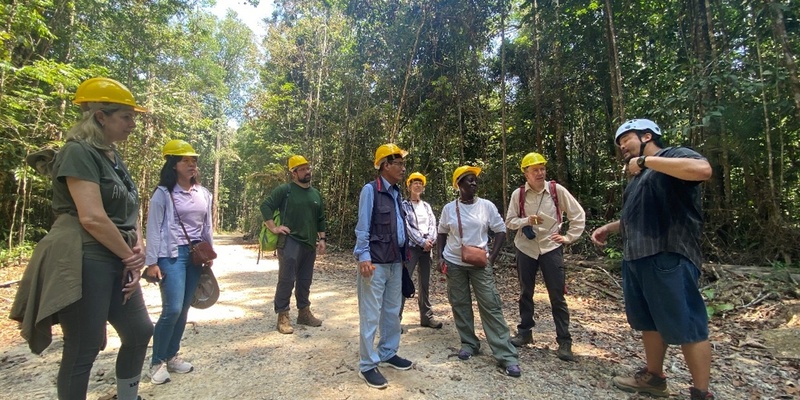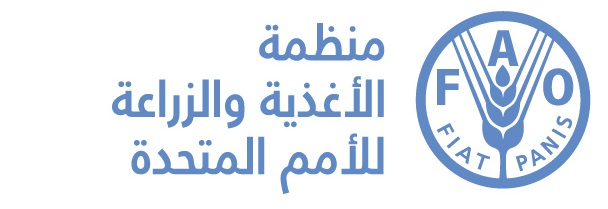اختتمت مجموعة التركيز التابعة لهيئة تدابير الصحة النباتية المعنية بتغير المناخ اجتماعها الأول حضورياً في البرازيل
Posted on إثنين, 28 أكتوبر 2024, 13:01

أعضاء مجموعة التركيز يزورون مشروع Amazon FACE في ماناوس. ©الاتفاقية الدولية لوقاية النباتات/ Mutya Frio
مانوس، البرازيل. 24 أكتوبر 2024. اجتمع أعضاء مجموعة التركيز المعنية بتغير المناخ وقضايا الصحة النباتية التابعة لهيئة تدابير الصحة النباتية حضورياً لأول مرة منذ إنشائها، واختتموا اجتماعهم التخطيطي الذي ركز في المقام الأول على تطوير خطة عمل المجموعة حتى عام 2026. تضم المجموعة أعضاء من البرازيل وكندا وجزر كوك وألمانيا وغانا ونيبال والمملكة المتحدة والولايات المتحدة وممثل من مكتب هيئة تدابير الصحة النباتية. وقد نظمت أمانة صحة الحيوان والنبات والتفتيش(SDA)، المنظمة الوطنية لوقاية النبات في البرازيل، الاجتماع الذي عقد في الفترة من 7 إلى 11 أكتوبر 2024 في مانوس بولاية الامزون. وقد عرضت SDA استضافة اجتماع مجموعة التركيز حضورياً خلال الدورة السابعة عشرة لهيئة تدابير الصحية النباتية (CPM-17) في عام 2023.
ناقشت المجموعة ردود الفعل الإيجابية التي تلقتها خلال سلسلة الندوات عبر الإنترنت الناجحة للغاية التي نظمتها في سبتمبر 2024، بعنوان "تغير المناخ والتدابير الصحية النباتية"، حيث حضر ما مجموعه 1023 مشاركًا افتراضيًا و 463 مشاهدًا للبث عبر الإنترنت. قامت المجموعة بتقييم الموضوعات المحددة حول تغير المناخ وصحة النبات التي قد يرغب أصحاب المصلحة في سماع المزيد عنها في المؤتمرات أو الندوات عبر الإنترنت المستقبلية. تم الاتفاق على إرسال استبيان ما بعد الندوة عبر الإنترنت للمشاركين يمكن أن يلتقط بشكل أفضل الموضوعات التي قد تهم أصحاب المصلحة.
في اجتماع ماناوس، قدم كل من أعضاء مجموعة التركيز خطط التكيف الوطنية لتغير المناخ في بلدانهم، بما في ذلك البرازيل وكندا وألمانيا وغانا ونيبال والمملكة المتحدة والولايات المتحدة. وقد قدم عضو مجموعة التركيز الذي يمثل مكتب تغير المناخ والبيئة والتنوع البيولوجي التابع لمنظمة الأغذية والزراعة أبرز ما جاء في استراتيجية تغير المناخ التابعة لمنظمة الأغذية والزراعة 2022-2031.
ولزيادة الوعي بتأثير تغير المناخ على صحة النبات، خططت مجموعة التركيز لهيكلة صفحة ويب جديدة على موقع الاتفاقية الدولية لوقاية النباتات كمخزن للمواد والموارد الفنية ذات الصلة، مثل الروابط الخارجية للأدوات ومصادر البيانات.
وقد تركز معظم الاجتماع الذي استمر أسبوعًا في تحديث خطة العمل الحالية لمجموعة التركيز ورسم خرائط لأنشطتها المحتملة، نظرًا لأن ولايتها قد تم تمديدها حتى عام 2026 في الدورة الثامنة لهيئة تدابير الصحة النباتية في أبريل 2024. ومن بين الأنشطة الرئيسية التي تم تحديدها دمج اعتبارات تغير المناخ في معيار تحليل مخاطر الآفات الجديد الذي سيتم تطويره من قبل مجموعة عمل الخبراء التابعة للاتفاقية الدولية لوقاية النباتات؛ وعقد جلسة جانبية في مؤتمر الصحة النباتية الدولي القادم للاتفاقية الدولية لوقاية النباتات أو تنظيم ندوة عالمية أخرى عبر الإنترنت؛ وإنشاء روابط مع منظمات دولية أخرى مثل الهيئة الدولية لتغير المناخ واتفاقية الأمم المتحدة للتنوع البيولوجي. ستقدم مجموعة التركيز خطة عملها المحدثة إلى مكتب CPM في ديسمبر للمراجعة والموافقة.
وأخيرًا، زارت مجموعة التركيز مشروع Amazon FACE، وهو مختبر في الهواء الطلق يحاكي الظروف المناخية المتدهورة عن طريق ضخ ثاني أكسيد الكربون الاصطناعي في الغلاف الجوي لاختبار قدرة غابات الأمازون المطيرة على تحمل مستويات ثاني أكسيد الكربون الأعلى. باستخدام تقنية إثراء الهواء الحر بثاني أكسيد الكربون (FACE)، تم إنشاء ستة قطع غابات تجريبية، محاطة بحلقة من الأبراج المعدنية. في ثلاث من القطع، سيتم إطلاق ثاني أكسيد الكربون لرفع التركيز إلى 200 جزء في المليون فوق المستويات المحيطة. سيراقب العلماء كيف تتغير بعض أنواع النباتات أو تتكيف أو تموت في الغابات المطيرة الاستوائية وما هو تأثير ذلك على الحيوانات والوظيفة البيئية العامة. مثل هذه البيانات مفيدة في التنبؤ بكيفية استجابة الأمازون لتغير المناخ وكذلك في تشكيل السياسات العالمية. تدير وزارة العلوم والتكنولوجيا والابتكار البرازيلية مشروع Amazon FACE ، بتمويل قدره 7.3 مليون جنيه إسترليني من المملكة المتحدة من خلال وزارة الخارجية والكومنولث والتنمية.
قال Dominic Eyre، كبير علماء صحة النبات في وزارة البيئة والغذاء والشؤون الريفية بالمملكة المتحدة ورئيس مجموعة التركيز: "لقد كان من دواعي سرور جميع أعضاء مجموعة التركيز أن يلتقوا شخصيًا وكان ذلك بمثابة انطلاقة مرحب بها من اجتماعاتنا الشهرية الافتراضية التي عقدناها منذ عام 2021". "لقد جعل هذا مناقشاتنا أكثر ديناميكية وتفاعلية وإثارة للاهتمام وإنتاجية. لقد تمكنا من تقييم ما حققته المجموعة حتى الآن، وما هي الأنشطة التي يجب أن نركز عليها في العامين المقبلين. كمجموعة، نظل ملتزمين بضمان أن يصبح تأثير تغير المناخ جزءًا لا يتجزأ من المحادثات والعمل على صحة النبات"، وأضاف.
يتم توفير الدعم المالي لعمل الاتفاقية الدولية لوقاية النباتات بشأن تغير المناخ من قبل كندا وأيرلندا والمملكة المتحدة.
معلومات ذات صلة
مجموعة التركيز التابعة لهيئة تدابير الصحة النباتية بشأن تغير المناخ وقضايا الصحة النباتية
تأثيرات تغير المناخ على آفات النباتات: مورد فني لدعم المنظمات الوطنية والإقليمية لوقاية النبات

